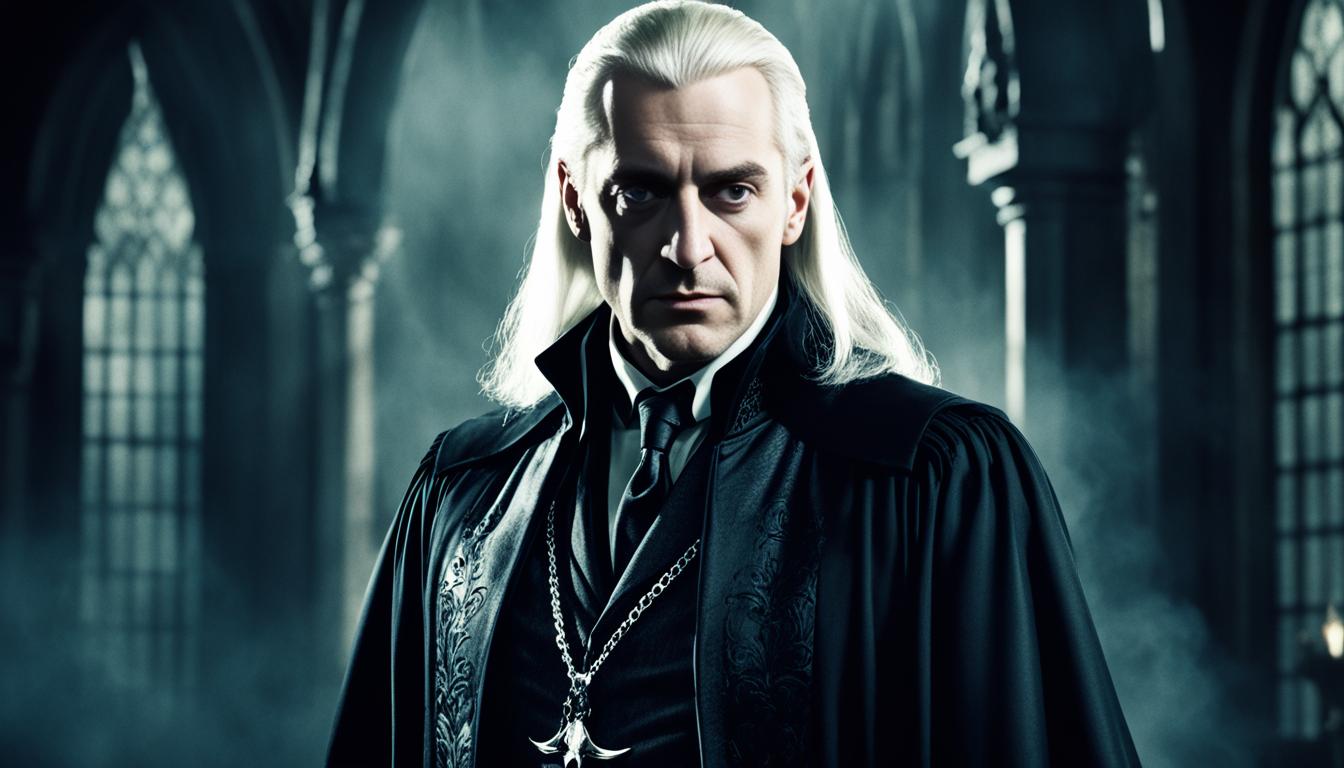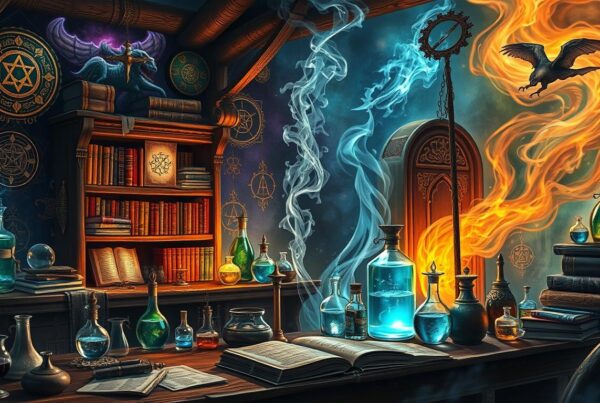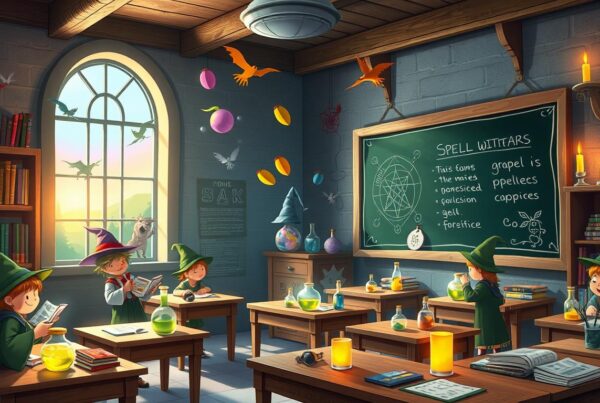The Malfoy family, one of the most notorious wizarding families in the Harry Potter series, is known for their long-standing belief in pureblood supremacy and association with dark magic. At the center of this dark legacy is Lucius Malfoy, whose past actions have had a profound impact on his son, Draco, and the entire wizarding world.
To fully understand the challenges and struggles faced by Draco throughout the series, it is crucial to explore Lucius Malfoy’s involvement with the Death Eaters and his unwavering loyalty to Lord Voldemort. Lucius’s choices and actions have not only shaped his own life but also the lives of his family members, leading to a complex web of consequences and redemption.
In this article, we will delve into the Malfoy family’s history, examining the roots of their pureblood ideology, Lucius’s early life and upbringing, and the events that led him down the path of darkness. By understanding the Malfoy legacy, we can gain a deeper appreciation for the complexity of the characters and the lessons that can be learned from their experiences.
The Malfoy Family’s Pureblood Supremacy Ideology
The Malfoy family, one of the oldest and most influential wizarding families in the magical world, has long been known for their adherence to the ideology of pureblood supremacy. This belief system, which holds that wizards and witches of pure wizarding lineage are inherently superior to those with Muggle ancestry, has shaped the Malfoys’ attitudes and actions for generations.
The concept of pureblood ideology is deeply rooted in the history of the wizarding world, with many ancient families priding themselves on their untainted magical heritage. The Malfoys, along with other notable families such as the Blacks and the Lestranges, have been staunch proponents of this ideology, often displaying open prejudice towards Muggles and Muggle-born wizards.
The Malfoy family’s belief in pureblood superiority has had a significant impact on their interactions with the rest of the wizarding world. They have been known to associate primarily with other pureblood families, often looking down upon those they consider to be of lesser blood status. This prejudice has led to the Malfoys’ involvement in various discriminatory practices and organizations, such as the exclusive Slytherin House at Hogwarts School of Witchcraft and Wizardry.
Furthermore, the Malfoys’ pureblood ideology has been closely linked to their fascination with the dark arts. Many pureblood supremacists believe that the practice of dark magic is a privilege reserved for those of pure wizarding lineage, and the Malfoy family is no exception. This connection between pureblood supremacy and the dark arts ultimately led to the family’s allegiance to Lord Voldemort, one of the most notorious dark wizards in history.
Lucius Malfoy’s Early Life and Upbringing
Lucius Malfoy’s childhood was shaped by his family’s long-standing commitment to pureblood supremacy. Born into the wealthy and influential Malfoy family, Lucius was raised by his father, Abraxas Malfoy, who instilled in him a deep sense of pride in their lineage and a belief in the inherent superiority of purebloods. From a young age, Lucius was taught to look down upon those of mixed or Muggle heritage, viewing them as inferior to those of pure wizarding blood.
As a child, Lucius was immersed in the world of pureblood society, attending exclusive gatherings and events where he mingled with other prominent wizarding families. These experiences further reinforced his belief in the importance of blood purity and the need to maintain the status quo within the wizarding world. Abraxas Malfoy, a strict and demanding father, ensured that Lucius was well-versed in the family’s history and the expectations placed upon him as the heir to the Malfoy legacy.
When Lucius began his Hogwarts years, he was naturally sorted into Slytherin House, where he found himself surrounded by like-minded individuals from other pureblood families. During his time at Hogwarts, Lucius formed close associations with other Slytherin students who shared his views on blood purity and the importance of maintaining the traditional hierarchy within the wizarding world. These friendships and alliances would later prove instrumental in his involvement with the Death Eaters.
Lucius’s early experiences, from his privileged upbringing to his immersion in pureblood society and his years at Hogwarts, played a crucial role in shaping his beliefs and setting the stage for his future actions. The influence of his father, combined with the reinforcement of his ideals through his associations with other purebloods, laid the foundation for Lucius’s unwavering commitment to the cause of blood purity and his eventual allegiance to Lord Voldemort and the Death Eaters.
Lucius Malfoy’s Involvement with the Death Eaters
Lucius Malfoy, the patriarch of the Malfoy family, was deeply involved with the Death Eaters, the loyal followers of the dark wizard Lord Voldemort during the First Wizarding War. As a prominent member of this notorious group, Lucius played a significant role in supporting Voldemort’s reign of terror and promoting the ideology of pureblood supremacy.
Throughout his time as a Death Eater, Lucius Malfoy participated in numerous dark acts and crimes in service to his master. He was known to use the Unforgivable Curses, particularly the Cruciatus Curse, to torture and intimidate those who opposed Voldemort’s rule. Lucius also used his wealth and influence to manipulate the Ministry of Magic and further the Death Eaters’ agenda.
One of the most notable instances of Lucius Malfoy’s involvement with the Death Eaters was his participation in the torture of Frank and Alice Longbottom, along with fellow Death Eaters Bellatrix Lestrange, Rodolphus Lestrange, and Barty Crouch Jr. The Longbottoms were subjected to the Cruciatus Curse for an extended period, which ultimately drove them to insanity. This heinous act showcased the depths of cruelty and depravity to which Lucius and his fellow Death Eaters were willing to sink in their pursuit of power and control.
Following the fall of Lord Voldemort at the end of the First Wizarding War, Lucius Malfoy faced the consequences of his actions. He was arrested and put on trial for his crimes as a Death Eater, but managed to avoid imprisonment in Azkaban by claiming that he had been under the influence of the Imperius Curse. Despite this claim, it was widely believed that Lucius had willingly served Voldemort and embraced the dark magic and ideology associated with the Death Eaters.
Lucius Malfoy’s involvement with the Death Eaters had far-reaching consequences for both his family and the wider wizarding world. His actions during the First Wizarding War cast a long shadow over the Malfoy name and left a lasting impact on his son, Draco, who would struggle to come to terms with his father’s dark past and the expectations placed upon him as a result.
The Malfoy Legacy: Draco’s Father’s Dark Past
Draco Malfoy, the son of Lucius Malfoy, was born into a family with a dark legacy. His father’s influence on his upbringing and worldview cannot be overstated. Lucius Malfoy’s involvement with the Death Eaters, a group of dark wizards led by Lord Voldemort, cast a shadow over the Malfoy family reputation and had a profound impact on Draco’s childhood.
As the heir to the Malfoy legacy, Draco faced immense pressure and expectations from a young age. His father’s status as a prominent Death Eater meant that Draco was raised to believe in the supremacy of pure-blood wizards and to look down upon those of mixed or Muggle ancestry. This deeply ingrained belief system, instilled by his father, shaped Draco’s actions and choices throughout his years at Hogwarts School of Witchcraft and Wizardry.
Growing up under the shadow of his father’s dark deeds took a psychological toll on Draco. He struggled to reconcile his own desires and moral compass with the expectations placed upon him by his family and their allegiance to the Dark Lord. Draco’s childhood trauma, stemming from his father’s influence and the weight of the Malfoy legacy, manifested in his often cruel and prejudiced behavior towards his classmates, particularly those he deemed inferior.
Throughout the Harry Potter series, Draco Malfoy grappled with the consequences of his father’s choices and the pressure to live up to the Malfoy name. His journey was one of inner conflict, as he navigated the path laid out for him by his father’s dark past while also confronting his own conscience and the realization that blindly following in Lucius Malfoy’s footsteps may not be the right course of action.
Lucius Malfoy’s Influence on Draco’s Upbringing
Lucius Malfoy’s parental influence played a significant role in shaping Draco’s character and beliefs. As a prominent figure in the wizarding world, Lucius instilled pureblood values and prejudices in his son from an early age. Draco grew up believing in the superiority of pure-blood wizards and the importance of maintaining the family’s status and reputation.
Lucius’s expectations and guidance had a profound impact on Draco’s behavior and relationships at Hogwarts. Draco’s rivalry with Harry Potter, who represented the antithesis of the Malfoy family’s beliefs, was fueled by his father’s influence. Lucius encouraged Draco to assert his dominance within Slytherin House and to cultivate connections with other pure-blood students.
The father-son relationship between Lucius and Draco was complex and evolving. While Draco initially idolized his father and sought to emulate his beliefs and actions, he gradually began to question the validity of his family’s ideology. As Draco witnessed the consequences of his father’s involvement with the Death Eaters and the toll it took on their family, he struggled to reconcile his own values with those imposed upon him by Lucius.
Lucius Malfoy’s parental influence was a driving force in Draco’s life, shaping his identity, relationships, and choices. The pureblood values and prejudices instilled in Draco from childhood had a lasting impact on his character and the Hogwarts rivalry he engaged in. However, as the series progressed, Draco began to question his father’s beliefs and the path laid out for him, leading to a complex and evolving father-son relationship within the context of Slytherin House and the wider wizarding world.
The Consequences of Lucius Malfoy’s Actions on His Family
Lucius Malfoy’s involvement with the Death Eaters and his unwavering loyalty to Lord Voldemort had severe consequences for his family’s reputation within the wizarding community. The Malfoys, once respected and influential, faced social ostracism and a significant loss of status as a result of Lucius’s actions. The family was shunned by many of their former allies and associates, who sought to distance themselves from the scandal and the association with the Dark Lord.
The physical and emotional toll on the Malfoy family was immense, particularly for Narcissa and Draco, who were left to navigate the fallout of Lucius’s choices. Narcissa, a devoted wife and mother, found herself in the difficult position of protecting her family while grappling with the consequences of her husband’s actions. Draco, still a young student at Hogwarts, faced the challenges of growing up in the shadow of his father’s misdeeds and the weight of the Malfoy legacy on his shoulders.
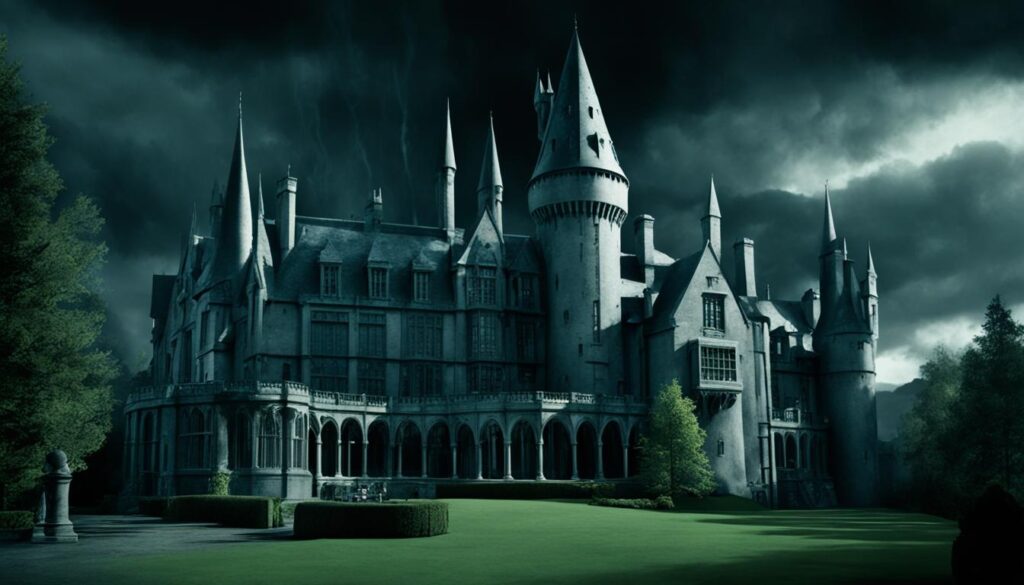
During Voldemort’s second rise to power, Malfoy Manor became a central hub for Death Eater activity, further tarnishing the family’s reputation. The once-grand estate was transformed into a dark and foreboding place, housing not only the Malfoys but also Voldemort himself and his inner circle. The events that transpired within the walls of Malfoy Manor, including the imprisonment and torture of Harry Potter and his friends, only served to deepen the family’s association with the Dark Lord and his heinous acts.
The Battle of Hogwarts marked a turning point for the Malfoys, as they were forced to confront the reality of their situation and the consequences of Lucius’s actions. Draco, in a moment of moral ambiguity, hesitated to join his fellow Death Eaters in the fight, while Narcissa’s love for her son ultimately led her to lie to Voldemort about Harry’s supposed death. These actions, though small in the grand scheme of the battle, hinted at the family’s internal struggle and the beginning of their path to redemption.
The consequences of Lucius Malfoy’s actions extended far beyond the immediate aftermath of the Second Wizarding War. The family faced a long and difficult road to rebuilding their reputation and finding their place in a society that had largely rejected them. The scars left by Voldemort’s punishment and the trauma endured within the walls of Malfoy Manor would linger, serving as a constant reminder of the steep price paid for Lucius’s allegiance to the Dark Lord.
Lucius Malfoy’s Fall from Grace
During the Second Wizarding War, Lucius Malfoy’s failures and missteps led to his downfall. His botched mission to retrieve the prophecy from the Department of Mysteries resulted in a humiliating defeat at the hands of Harry Potter and his friends. This failure not only exposed Lucius’s incompetence but also revealed his true allegiance to the Dark Lord, leading to his arrest and imprisonment in Azkaban.
The consequences of Lucius’s failures were severe. His second imprisonment in Azkaban left the Malfoy family vulnerable and exposed. Voldemort’s growing disappointment and distrust in the Malfoys further eroded their standing within the Death Eater ranks. The once-proud and influential Malfoy family found themselves facing a steep decline in power and influence.
Lucius Malfoy’s fall from grace had a profound impact on his family, particularly his son, Draco. With his father imprisoned, Draco was forced to take on a more active role as a Death Eater, tasked with the impossible mission of assassinating Albus Dumbledore. The pressure and fear Draco experienced during this time left lasting scars on the young wizard, forever altering his perception of his family’s legacy and his own future.
The Malfoy Family’s Struggle for Redemption
In the post-war era, the Malfoy family faced a long and arduous journey towards redemption. Narcissa Malfoy played a pivotal role in this redemption arc, as her love for her son Draco and her decision to save Harry Potter’s life during the Battle of Hogwarts set the stage for the family’s eventual reconciliation with the wizarding world. Despite their dark past and association with the Death Eaters, Narcissa’s actions demonstrated that the Malfoys were capable of change and growth.
However, the road to redemption was not an easy one. The Malfoys faced numerous challenges as they sought to rebuild their lives and reputations in the aftermath of the war. Many in the wizarding community still harbored deep-seated prejudice and mistrust towards the family, given their long history of pureblood supremacy and involvement with Lord Voldemort. Draco, in particular, struggled to shed the weight of his father’s dark legacy and prove that he had truly changed.
One of the most significant moments in the Malfoys’ redemption arc came when Harry Potter himself testified on behalf of Narcissa and Draco during their trials before the Wizengamot. Harry’s testimony, which highlighted Narcissa’s crucial role in saving his life and Draco’s reluctance to identify him at Malfoy Manor, played a vital role in securing more lenient sentences for the mother and son. This act of forgiveness from the person who had once been their enemy served as a powerful symbol of the potential for change and reconciliation in the post-war era.
As time passed, Draco worked hard to distance himself from his father’s dark past and forge his own path. He took steps to make amends for his previous actions, including apologizing to those he had wronged and working to promote greater understanding between pure-bloods and Muggle-borns. Slowly but surely, the Malfoys began to earn back the trust and respect of the wizarding community, proving that even those with the darkest of pasts could find redemption through love, growth, and a commitment to change.
The Lasting Impact of Lucius Malfoy’s Dark Past on the Wizarding World
Lucius Malfoy’s involvement with the Death Eaters and his unwavering support for Voldemort’s pureblood ideology had far-reaching consequences for the wizarding world, even after the Dark Lord’s defeat. The exposure of his crimes and the subsequent fall from grace of the Malfoy family served as a stark reminder of the dangers of prejudice and the importance of post-war reconciliation.
In the aftermath of the Second Wizarding War, the wizarding community faced the daunting task of rebuilding not only their physical world but also their social fabric. The trials of former Death Eaters, including Lucius Malfoy, played a crucial role in this process, as they brought to light the atrocities committed in the name of pureblood supremacy. These trials served as a catalyst for a shift in attitudes towards Muggles and Muggle-born wizards, as many began to question the validity of the long-held beliefs that had fueled the conflict.
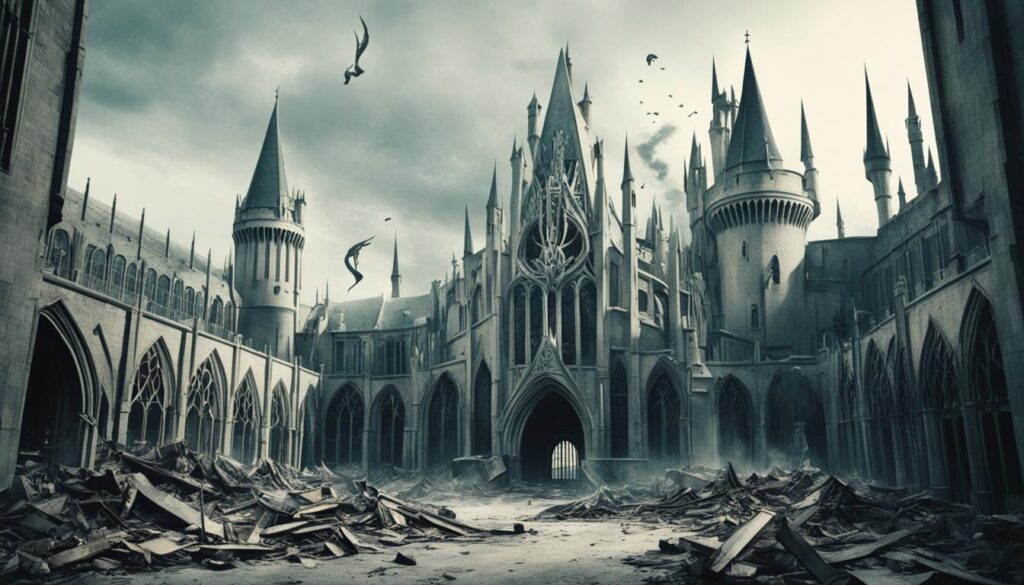
The Malfoy family legacy, once a symbol of wealth, power, and influence, became tainted by association with the Dark Lord. The revelations of Lucius Malfoy’s actions during the war had a profound impact on how the family was perceived by the rest of the wizarding world. They faced ostracism and stigma, as many held them accountable for their role in perpetuating Voldemort’s reign of terror.
Despite the challenges, the post-war period also presented an opportunity for growth and change. The Malfoy family’s struggle for redemption, as well as the efforts of other former Death Eaters to make amends, demonstrated the potential for reconciliation and the importance of second chances. This process of healing and forgiveness was essential for the wizarding world to move forward and build a more inclusive and equitable society.
Ultimately, the lasting impact of Lucius Malfoy’s dark past served as a reminder of the dangers of prejudice and the importance of unity in the face of adversity. It highlighted the need for open dialogue, understanding, and the willingness to learn from the mistakes of the past. As the wizarding world continued to grapple with the aftermath of the war, the legacy of the Malfoy family stood as a testament to the long and difficult road to reconciliation and the ongoing struggle to build a better future for all.
Lessons Learned from the Malfoy Family’s Experience
The Malfoy family’s story serves as a powerful lesson about the importance of individual choices and the transformative power of love and forgiveness in overcoming darkness. Despite being raised in an environment steeped in pureblood supremacy and prejudice, Draco Malfoy ultimately chose a path of redemption, breaking free from the cycle of hatred perpetuated by his father, Lucius.
Draco’s journey highlights the dangers of blindly following in one’s parents’ footsteps without questioning their beliefs or actions. It underscores the significance of critical thinking and independent decision-making, even in the face of immense familial pressure and societal expectations. By choosing to forge his own path, Draco demonstrated that it is possible to break free from the shackles of prejudice and embrace a more compassionate worldview.
Moreover, the Malfoy family’s experiences showcase the transformative power of forgiveness and the potential for redemption, even for those who have committed grave mistakes. Despite his past involvement with the Death Eaters and his role in perpetuating pureblood supremacy, Lucius Malfoy was eventually given a chance to atone for his actions and rebuild his life. This serves as a reminder that no one is beyond the reach of forgiveness and that even the most deeply entrenched prejudices can be overcome through love, understanding, and a willingness to change.
Ultimately, the Malfoy family’s story teaches us that our choices have profound consequences, not only for ourselves but for those around us. By choosing to embrace empathy, compassion, and acceptance, we can break the cycle of prejudice and create a more inclusive and harmonious society. The lessons learned from the Malfoys’ experiences serve as a powerful reminder that it is never too late to seek redemption and that even in the darkest of times, there is always hope for a brighter future.
Conclusion
Throughout this article, we have explored the complex legacy of Lucius Malfoy and its profound impact on his son Draco and the wizarding world as a whole. Lucius Malfoy’s dark past, rooted in pureblood supremacy and his involvement with the Death Eaters, had far-reaching consequences for his family and society. His actions and beliefs heavily influenced Draco’s upbringing, shaping the young wizard’s early attitudes and decisions.
However, the Malfoy family’s story also highlights the power of personal growth and the potential for redemption. Draco Malfoy’s character arc in the Harry Potter series demonstrates the importance of overcoming adversity and breaking free from the shackles of family influence. The lessons learned from the Malfoys’ experiences resonate with readers, as they touch upon universal themes of family dynamics, individual choices, and the eternal struggle between good and evil.
The enduring legacy of the Malfoy family serves as a testament to the complexity of human nature and the transformative power of love and forgiveness. Their story continues to captivate audiences, reminding us that even in the darkest of times, there is always hope for change and redemption. As we reflect on Lucius Malfoy’s legacy and its impact on the wizarding world, we are reminded of the importance of standing up for what is right and the strength that lies within each of us to overcome the shadows of our past.
